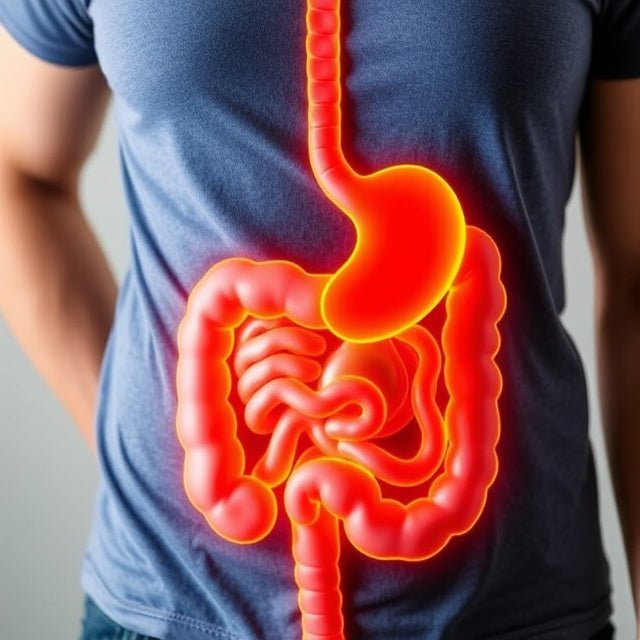
Gut Transit Time: What It Is, Why It Matters, How to Measure It, and How Nutrition Plays a Role in Improving It
Gut transit time refers to the amount of time it takes for food to travel from the mouth, through the digestive system, and eventually be eliminated from the body. This process is essential for proper digestion, nutrient absorption, and the elimination of waste. Understanding your gut transit time and its impact on your health can help you make informed decisions about your diet and lifestyle to improve digestion, reduce discomfort, and promote overall well-being.
What Is Gut Transit Time?
Gut transit time, also known as gastrointestinal transit time, is the period it takes for food to pass through the digestive tract, including the stomach, small intestine, and large intestine (colon). It involves a complex series of movements and processes that break down food, absorb nutrients, and eliminate waste. Transit time is affected by various factors, including diet, lifestyle, stress, and overall gut health.
Typically, a normal gut transit time ranges from 24 to 72 hours, with food passing through the stomach and small intestine in roughly 6 to 8 hours and then continuing through the large intestine. The overall time depends on how well your digestive system is functioning, how efficiently it processes food, and how quickly the body can eliminate waste.
Why Is Gut Transit Time Important?
Gut transit time plays a crucial role in your overall digestive health. If the transit time is too fast or too slow, it can result in various digestive issues that can affect your health in different ways. Understanding the significance of gut transit time is key to recognizing when it may be an issue and taking appropriate steps to address it.
-
Nutrient Absorption: The longer food stays in the digestive tract, the more time your body has to absorb the essential nutrients it needs. If the gut transit time is too fast, food may pass through the digestive system too quickly, and the body may not absorb the full range of vitamins, minerals, and other nutrients. On the other hand, if the transit time is too slow, the body may over-absorb certain nutrients, leading to an imbalance in nutrient levels.
-
Digestive Comfort: A balanced gut transit time promotes proper digestion and minimizes discomfort. If food moves too quickly through the system (diarrhea or rapid transit), it may result in gas, bloating, and diarrhea. If food moves too slowly (constipation), it can cause bloating, discomfort, and the buildup of waste in the intestines.
-
Elimination of Waste: Proper transit time helps ensure that waste and toxins are effectively eliminated from the body. When waste stays in the colon for too long, it may lead to constipation and the accumulation of harmful substances in the body. A healthy gut transit time helps prevent these problems and supports regular bowel movements.
-
Gut Microbiome Health: The gut microbiome, the trillions of bacteria and microorganisms living in the digestive system, thrives in a balanced environment. A normal transit time helps maintain the right balance of gut bacteria, preventing the overgrowth of harmful bacteria and supporting the diversity of beneficial microbes. If transit time is too slow or too fast, it can disrupt the balance of your microbiome, leading to digestive issues and other health problems.
How Does Gut Transit Time Impact Your Health?
Gut transit time has a significant impact on various aspects of health, including digestion, immunity, and even mental health. Below are some of the ways gut transit time affects your health:
-
Constipation: If gut transit time is slow, it can lead to constipation, a condition where stool becomes dry, hard, and difficult to pass. This can lead to bloating, discomfort, and even more serious health issues if left untreated. Slow transit time is often associated with a lack of fiber, dehydration, and a sedentary lifestyle.
-
Diarrhea: On the other hand, if transit time is too fast, food may pass through the digestive tract too quickly, leading to diarrhea. This can result in dehydration, electrolyte imbalances, and malabsorption of nutrients. Factors like stress, infections, or a diet high in processed foods may contribute to rapid gut transit time.
-
Irritable Bowel Syndrome (IBS): An imbalanced gut transit time is often linked to IBS, a condition that causes abdominal pain, bloating, diarrhea, and constipation. Both slow and rapid transit times can contribute to the symptoms of IBS, making it crucial to maintain a balanced transit time to reduce flare-ups.
-
Gut Microbiome Imbalance: As mentioned, the gut microbiome plays a critical role in digestion, immunity, and overall health. A disruption in transit time can affect the balance of gut bacteria. Slow transit times may encourage the overgrowth of harmful bacteria in the large intestine, leading to conditions such as small intestinal bacterial overgrowth (SIBO). Conversely, rapid transit times may not allow beneficial bacteria to properly ferment fibers and produce short-chain fatty acids, which are vital for gut health.
-
Mental Health: There is growing evidence linking gut health to mental health. An imbalance in the gut microbiome, often resulting from poor gut transit time, may influence mood and mental well-being. Conditions like anxiety and depression have been associated with an imbalanced gut microbiome, highlighting the importance of maintaining healthy gut transit time for mental health.
-
Weight Management: Slow gut transit time has been linked to weight gain, as longer transit times allow the body to absorb more calories from food. Conversely, rapid transit time may lead to nutrient malabsorption and difficulty maintaining a healthy weight. A balanced transit time helps optimize nutrient absorption and supports healthy metabolism.
How Can You Measure Gut Transit Time?
Measuring gut transit time is not always straightforward, but there are a few methods that can provide insights into how efficiently your digestive system is functioning. Some methods are more accessible and easy to do at home, while others may require medical assistance.
-
Stool Color and Texture: One simple way to gauge your gut transit time is by observing the color and texture of your stool. If you have slow transit time, your stool may be harder and more difficult to pass, while rapid transit time may result in loose or watery stool. Additionally, the color of your stool can indicate whether food is moving too quickly or too slowly through your digestive system.
-
The "Corn Test": A common at-home method for measuring gut transit time is the "corn test." This involves consuming a meal containing corn kernels, which are not fully digested. After consuming the meal, track when you see the undigested corn in your stool. The time it takes for the corn to appear is an indication of how long it took for food to travel through your digestive system. This is a simple but somewhat imprecise method.
-
Radioactive Marker Method: In clinical settings, healthcare professionals can use a radioactive marker method to measure gut transit time. This involves swallowing a small amount of a harmless radioactive substance, which is tracked as it moves through the digestive tract using imaging technology. This method is highly accurate but requires medical supervision.
-
Smart Pills: Some companies now offer "smart pills" that you swallow. These pills contain sensors that monitor the movement of food through your digestive system. They can provide a precise measurement of your gut transit time and send the data to a device for analysis. This method is often used in clinical studies or for patients with digestive disorders.
How Can Nutrition Improve Gut Transit Time?
Nutrition plays a significant role in maintaining a healthy gut transit time. By making mindful dietary choices, you can support your digestive system, optimize nutrient absorption, and promote regular bowel movements. Here are some nutritional strategies to improve gut transit time:
-
Increase Fiber Intake: Dietary fiber is one of the most important factors in promoting healthy gut transit time. Fiber adds bulk to stool, making it easier to pass and preventing constipation. It also helps to regulate the movement of food through the intestines, promoting a balanced transit time. Good sources of fiber include fruits, vegetables, whole grains, legumes, and nuts.
-
Stay Hydrated: Drinking plenty of water is essential for healthy digestion and optimal gut transit time. Adequate hydration helps soften stool, making it easier to pass and preventing constipation. Aim to drink at least 8 cups of water a day, and more if you're active or live in a hot climate.
-
Consume Probiotics: Probiotics are beneficial bacteria that can help balance the gut microbiome. Consuming probiotic-rich foods such as yogurt, kefir, sauerkraut, and kimchi can support a healthy gut microbiota and improve gut transit time. Probiotics help regulate digestion, prevent constipation, and maintain gut health.
-
Incorporate Prebiotics: Prebiotics are non-digestible fibers that feed beneficial gut bacteria. By including prebiotic foods like onions, garlic, bananas, and asparagus in your diet, you can promote the growth of good bacteria in your gut, which can help regulate transit time and support overall digestive health.
-
Limit Processed Foods: Processed and high-fat foods can slow down digestion and contribute to imbalanced gut transit time. Reducing your intake of refined sugars, unhealthy fats, and processed snacks can improve your gut health and promote regular bowel movements.
-
Manage Stress: Chronic stress can affect gut transit time, causing either diarrhea or constipation. Managing stress through mindfulness, exercise, and relaxation techniques can help regulate digestion and improve gut health.
Conclusion
Gut transit time is an essential aspect of digestive health that affects nutrient absorption, waste elimination, and the balance of your gut microbiota. A balanced transit time is crucial for preventing conditions like constipation, diarrhea, and irritable bowel syndrome (IBS). Measuring your gut transit time can provide valuable insights into how well your digestive system is functioning, and making the right nutritional choices can help optimize it. By increasing fiber intake, staying hydrated, consuming probiotics and prebiotics, and managing stress, you can support your digestive health and improve your gut transit time for better overall well-being.

